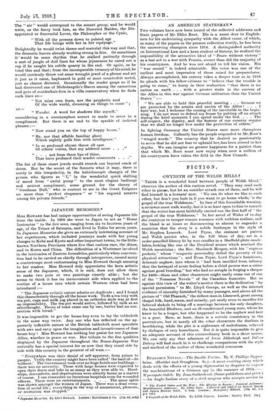FICTION.
GWYNETH OF THE WELSH HILLS.t
" MERE is a wonderful bond between people of Welsh blood," observes the author of this curious novel. " They may rend each other in pieces, but let an outsider attack one of them, and he will find himself in a hornets' nest. We can do what we like to each other, but don't you butt in if you want to go home whole,' is the gospel of the true Welshman." In face of this formidable warning, a reviewer must walk warily, but it is at least open to him to remark that the writer has most faithfully carried out the first half of " the gospel of the true Welshman." In her novel of Wales of to-day she contrives to temper roseate romance with ruthless realism, and the blend is at times so disconcerting as almost to engender a suspicion that the story is a subtle burlesque in the style of Mr. Stephen Leacock. Lord Pryse, the eminent art patron and Welsh patriot who, in the full blaze of day, sat in a cedar-panelled library lit by wax candles in a Sheffield plate cande- labra, looking like one of the Druidical stones which sentinel the Welsh mountains ; the Rev. Shadrach Morgan, with his " copious pockets," whose " magnetic personality defied the poverty of his physical attractions" ; and Evan Pryse, Lord Pryso's handsome, debonair nephew, into whom it " had been instilled from infancy that the betrayal of acute feeling before a third person was a crime against good breeding," but who had no scruple in forging a cheque for £400—these and other characters might easily come out of one of the " Nonsense Novels " of the Canadian humorist. But as against this view of the writer's motive there is the dedication " by special permission " to Mr. Lloyd George, as well as the internal evidence of sincerity furnished by many passages, and above all the picture of " Old Pharaoh," the richest man in Llancoed, great among chapel folk, hard, mean, and miserly, yet ready even to sacrifice his beloved shekels to bring off a marriage between his only daughter, the beautiful Blodwen, and an ill-conditioned young man, whom he knew to be a forger, but who happened to be the nephew and heir to a peer. Here, at least, there is a certain consistency in the portraiture, but in nearly all the other characters the dualism is bewildering, while the plot is a nightmare of melodrama, relieved by dialogue of racy homeliness. But it is quite impossible to give an adequate account of this extraordinary book in a short notice. We can only say that admirers of Irene Iddesleigh and Delina Delany will find much in it to challenge comparisons with the style and method of the author of those wonderful romances.


























 Previous page
Previous page